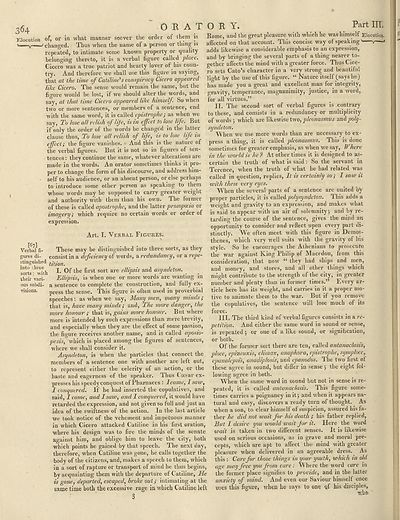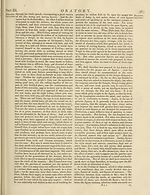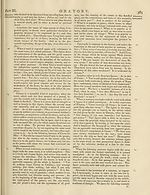Encyclopaedia Britannica > Volume 15, NIC-PAR
(414) Page 364
Download files
Complete book:
Individual page:
Thumbnail gallery: Grid view | List view

364 0 R A T
[Elocution of, or in what manner soever the order of them is
-v——' changed. Thus when the name oi a person or thing is
repeated, to intimate some known property or quality
belonging thereto, it is a verbal figure called place.
Cicero was a true patriot and hearty lover of his coun¬
try. And therefore we shall use this figure in saying,
that at the time of Catiline"1 s conspiracy Cicero appeared
like Cicero. The sense would remain the same, but the
figure would be lost, if we should alter the words, and
say, at that time Cicero appeared like himself. So when
two or more sentences, or members ot a sentence, end
with the same word, it is called epistrophei as when we
say, To lose all relish of life, is in effect to lose life. But
if only the order of the words be changed in the latter
clause thus, To lose all relish oj life, is to lose life in
effect; the figure vanishes. And this is the nature of
the verbal figures. But it is not so m figures of sen¬
tences : they continue the same, whatever alterations are
made in the words. An orator sometimes thinks it pro¬
per to change the form of his discourse, and address him¬
self to his audience, or an absent person, or else perhaps
to introduce some other person as speaking to them
whose words may be supposed to carry greater weight
and authority with them than his own. I he former
of these is called apostrophe, and the latter prosopeda or
imagery 1 which require no certain words or order of
expression.
Art. I. Verbal Figures.
\
Verbal! fi- These may be distinguished into three sorts, as they
gures di- consist in a deficiency of words, a redundancy, or a repe-
stinguished
sorts: with 0f t,ie first sort are ellipsis mA asyndeton.
their vari- Ellipsis, is when one or more words are wanting in
ous subdi- a sentence to complete the construction, and fully ex-
visions. press the sense. This figure is often used in proverbial
speeches: as when we say, Many men, many minds;
that is, have many minds ; and, The more danger, the
more honour ; that is, gains more honour. But where
more is intended by such expressions than mere brevity,
and especially when they are the effect of some passion,
the figure receives another name, and is called aposio-
pesis, which is placed among the figures of sentences,
where we shall consider it.
Asyndeton, is when the particles that connect the
members of a sentence one with another are left out,
to represent either the celerity of an action, or the
haste and eagerness of the speaker. Thus Caesar ex¬
presses his speedy conquest of Fharnaces : Icame, 1 saw,
I conquered. If he had inserted the copulatives, and
said, I came, and I saw, and I conquered, it would have
retarded the expression, and not given so full and just an
idea of the swiftness of the action. In the last article
we took notice of the vehement and impetuous manner
in which Cicero attacked Catiline in bis first oration,
where his design was to fire the minds of the senate
against him, and oblige him to leave the city, both
which points he gained by that speech. The next day,
therefore, when Catiline was gone, he calls together the
body of the citizens, and, makes a speech to them, which
in a sort of rapture or transport of mind he thus begins,
by acquainting them with the departure of Catiline, He
is gone, departed, escaped, broke out; intimating at the
same time both the excessive rage in which Catiline left
3
O R Y. Part III,
Home, and the great pleasure with which he was himself Elocution,
affected on that account. This concise way of speaking' v
adds likewise a considerable emphasis to an expression,
and by bringing the several parts of a thing nearer to¬
gether affects the mind with a greater force. Thus Cice¬
ro sets Cato’s character in a very strong and beautiful
light by the use of this figure. “ Nature itself (says he)
has made you a great and excellent man for integrity,
gravity, temperance, magnanimity, justice, in a word,
for all virtues.”
II. The second sort of verbal figures is contrary
to these, and consists in a redundancy or multiplicity
of words 5 which are likewise two, pleonasmus and poly¬
syndeton.
W hen we use more words than are necessary to ex¬
press a thing, it is called pleonasmus. This is done
sometimes for greater emphasis, as when we say, Where
in the world is he? At other times it is designed to as¬
certain the truth of what is said: So. the servant in
Terence, when the truth of what he had related was
called in question, replies, It is certainly so ; I saw it
with these very eyes.
When the several parts of a sentence are united by
proper particles, it is called polysyndeton. This adds a
weight and gravity to an expression, and makes what
is said to appear with an air of solemnity •, and by re¬
tarding the course of the sentence, gives the mind an
opportunity to consider and reflect upon every part di¬
stinctly. We often meet with this figure in Demos¬
thenes, which very well suits with the gravity of his
style. So he encourages the Athenians to prosecute
the war against King Philip of Macedon, from this
consideration, that now “ they had ships and men,
and money, and stores, and all other things which
might contribute to the strength of the city, in greater
number and plenty than in former times.” Every ar¬
ticle here has its weight, and carries in it a proper mo¬
tive to animate them to the war. But if you remove
the copulatives, the sentence will lose much of its
force.
III. The third kind of verbal figures consists in a re¬
petition. And either the same word in sound or sense,
is repeated \ or one of a like sound, or signification,
or both.
Of the former sort there are ten, called antanaclasis,
plocc, epi’zeuxis, climax, anaphora, epistrophe, symploce,
cpanalcpsis, anadiplosis, and epenodos. The two first ot
these agree in sound, but difl'er in sense} the eight fol¬
lowing agree in both.
When the same wrord in sound but not in sense is re¬
peated, it is called antanaclasis. This figure some¬
times carries a poignancy in it j and when it appears na¬
tural and easy, discovers a ready turn of thought. As
when a son, to clear himself of suspicion, assured his fa¬
ther he did not wait for his death ; his father replied.
But I desire you would wait Jor it. Here the word
wait is taken in two diflerent senses. It is likewise
used on serious occasions, as in grave and moral pre¬
cepts, which are apt to affect tlm mind with greater
pleasure when delivered in an agreeable dress. As
this : Carefor those things in your youth, which in old
acre may free you from care : Where the word care in
the former place signifies to provide, and in the latter
anxiety of mind. And even our Saviour himself once
uses this figure, when he says to one qf his disciples,
who
[Elocution of, or in what manner soever the order of them is
-v——' changed. Thus when the name oi a person or thing is
repeated, to intimate some known property or quality
belonging thereto, it is a verbal figure called place.
Cicero was a true patriot and hearty lover of his coun¬
try. And therefore we shall use this figure in saying,
that at the time of Catiline"1 s conspiracy Cicero appeared
like Cicero. The sense would remain the same, but the
figure would be lost, if we should alter the words, and
say, at that time Cicero appeared like himself. So when
two or more sentences, or members ot a sentence, end
with the same word, it is called epistrophei as when we
say, To lose all relish of life, is in effect to lose life. But
if only the order of the words be changed in the latter
clause thus, To lose all relish oj life, is to lose life in
effect; the figure vanishes. And this is the nature of
the verbal figures. But it is not so m figures of sen¬
tences : they continue the same, whatever alterations are
made in the words. An orator sometimes thinks it pro¬
per to change the form of his discourse, and address him¬
self to his audience, or an absent person, or else perhaps
to introduce some other person as speaking to them
whose words may be supposed to carry greater weight
and authority with them than his own. I he former
of these is called apostrophe, and the latter prosopeda or
imagery 1 which require no certain words or order of
expression.
Art. I. Verbal Figures.
\
Verbal! fi- These may be distinguished into three sorts, as they
gures di- consist in a deficiency of words, a redundancy, or a repe-
stinguished
sorts: with 0f t,ie first sort are ellipsis mA asyndeton.
their vari- Ellipsis, is when one or more words are wanting in
ous subdi- a sentence to complete the construction, and fully ex-
visions. press the sense. This figure is often used in proverbial
speeches: as when we say, Many men, many minds;
that is, have many minds ; and, The more danger, the
more honour ; that is, gains more honour. But where
more is intended by such expressions than mere brevity,
and especially when they are the effect of some passion,
the figure receives another name, and is called aposio-
pesis, which is placed among the figures of sentences,
where we shall consider it.
Asyndeton, is when the particles that connect the
members of a sentence one with another are left out,
to represent either the celerity of an action, or the
haste and eagerness of the speaker. Thus Caesar ex¬
presses his speedy conquest of Fharnaces : Icame, 1 saw,
I conquered. If he had inserted the copulatives, and
said, I came, and I saw, and I conquered, it would have
retarded the expression, and not given so full and just an
idea of the swiftness of the action. In the last article
we took notice of the vehement and impetuous manner
in which Cicero attacked Catiline in bis first oration,
where his design was to fire the minds of the senate
against him, and oblige him to leave the city, both
which points he gained by that speech. The next day,
therefore, when Catiline was gone, he calls together the
body of the citizens, and, makes a speech to them, which
in a sort of rapture or transport of mind he thus begins,
by acquainting them with the departure of Catiline, He
is gone, departed, escaped, broke out; intimating at the
same time both the excessive rage in which Catiline left
3
O R Y. Part III,
Home, and the great pleasure with which he was himself Elocution,
affected on that account. This concise way of speaking' v
adds likewise a considerable emphasis to an expression,
and by bringing the several parts of a thing nearer to¬
gether affects the mind with a greater force. Thus Cice¬
ro sets Cato’s character in a very strong and beautiful
light by the use of this figure. “ Nature itself (says he)
has made you a great and excellent man for integrity,
gravity, temperance, magnanimity, justice, in a word,
for all virtues.”
II. The second sort of verbal figures is contrary
to these, and consists in a redundancy or multiplicity
of words 5 which are likewise two, pleonasmus and poly¬
syndeton.
W hen we use more words than are necessary to ex¬
press a thing, it is called pleonasmus. This is done
sometimes for greater emphasis, as when we say, Where
in the world is he? At other times it is designed to as¬
certain the truth of what is said: So. the servant in
Terence, when the truth of what he had related was
called in question, replies, It is certainly so ; I saw it
with these very eyes.
When the several parts of a sentence are united by
proper particles, it is called polysyndeton. This adds a
weight and gravity to an expression, and makes what
is said to appear with an air of solemnity •, and by re¬
tarding the course of the sentence, gives the mind an
opportunity to consider and reflect upon every part di¬
stinctly. We often meet with this figure in Demos¬
thenes, which very well suits with the gravity of his
style. So he encourages the Athenians to prosecute
the war against King Philip of Macedon, from this
consideration, that now “ they had ships and men,
and money, and stores, and all other things which
might contribute to the strength of the city, in greater
number and plenty than in former times.” Every ar¬
ticle here has its weight, and carries in it a proper mo¬
tive to animate them to the war. But if you remove
the copulatives, the sentence will lose much of its
force.
III. The third kind of verbal figures consists in a re¬
petition. And either the same word in sound or sense,
is repeated \ or one of a like sound, or signification,
or both.
Of the former sort there are ten, called antanaclasis,
plocc, epi’zeuxis, climax, anaphora, epistrophe, symploce,
cpanalcpsis, anadiplosis, and epenodos. The two first ot
these agree in sound, but difl'er in sense} the eight fol¬
lowing agree in both.
When the same wrord in sound but not in sense is re¬
peated, it is called antanaclasis. This figure some¬
times carries a poignancy in it j and when it appears na¬
tural and easy, discovers a ready turn of thought. As
when a son, to clear himself of suspicion, assured his fa¬
ther he did not wait for his death ; his father replied.
But I desire you would wait Jor it. Here the word
wait is taken in two diflerent senses. It is likewise
used on serious occasions, as in grave and moral pre¬
cepts, which are apt to affect tlm mind with greater
pleasure when delivered in an agreeable dress. As
this : Carefor those things in your youth, which in old
acre may free you from care : Where the word care in
the former place signifies to provide, and in the latter
anxiety of mind. And even our Saviour himself once
uses this figure, when he says to one qf his disciples,
who
Set display mode to:
![]() Universal Viewer |
Universal Viewer | ![]() Mirador |
Large image | Transcription
Mirador |
Large image | Transcription
Images and transcriptions on this page, including medium image downloads, may be used under the Creative Commons Attribution 4.0 International Licence unless otherwise stated. ![]()
| Encyclopaedia Britannica > Encyclopaedia Britannica > Volume 15, NIC-PAR > (414) Page 364 |
|---|
| Permanent URL | https://digital.nls.uk/192587080 |
|---|
| Attribution and copyright: |
|
|---|
| Shelfmark | EB.11 |
|---|---|
| Description | Ten editions of 'Encyclopaedia Britannica', issued from 1768-1903, in 231 volumes. Originally issued in 100 weekly parts (3 volumes) between 1768 and 1771 by publishers: Colin Macfarquhar and Andrew Bell (Edinburgh); editor: William Smellie: engraver: Andrew Bell. Expanded editions in the 19th century featured more volumes and contributions from leading experts in their fields. Managed and published in Edinburgh up to the 9th edition (25 volumes, from 1875-1889); the 10th edition (1902-1903) re-issued the 9th edition, with 11 supplementary volumes. |
|---|---|
| Additional NLS resources: |
|

